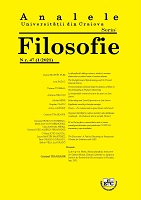THE ENLIGHTENMENT EPISTEMOLOGY AND ITS PRESENT BLURRED MIRROR
THE ENLIGHTENMENT EPISTEMOLOGY AND ITS PRESENT BLURRED MIRROR
Author(s): Ana BazacSubject(s): Epistemology, Early Modern Philosophy
Published by: Editura Universitaria Craiova
Keywords: Kant; Critique of Pure Reason (1781); What is Enlightenment; Contest of Faculties; Jean-Jacques Rousseau; epistemological constructivism; critique; maximalist ethics;
Summary/Abstract: The paper tries to demonstrate the hypothesis that the Enlightenment epistemology, synthetically represented by Kant, is the unity between the epistemological criticism or more precisely the epistemological (and not mathematical) constructivist approach of knowledge as mental processing of the tools of mind and the ethical maximalism of the categorical imperative. Actually, the ethical maximalism was conceived of and is conceivable only in tandem with and as a result of the epistemological constructivism that alone enabled the responsibility without which the ethical stakes remain an exterior normative speculation. The unity arose from and supported the development of the concept of critique as autonomous use of reason, of education of the critical spirit, and of public presence of critiques. Surveying Kant’s What is Enlightenment and Contest of Faculties, the concepts and the logic related to the critical spirit are described, as well as their interpretations by Deleuze and Foucault. One conclusion of the article is that the radical character of Enlightenment is given not by its liberal political theories but just by the above mentioned unity. With Enlightenment, criticism became more than the critique of empirical facts and abstract theories: it became a transcendental methodology uniting the conditions of every type of criticism and advancing the logic of self-criticism and moral construction.
Journal: ANALELE UNIVERSITĂȚII DIN CRAIOVA. SERIA FILOSOFIE
- Issue Year: 1/2021
- Issue No: 47
- Page Range: 30-72
- Page Count: 43
- Language: English

